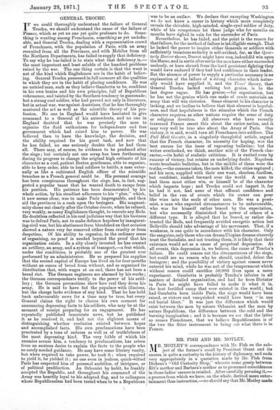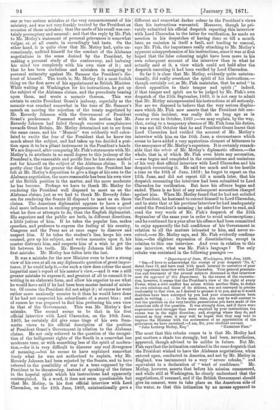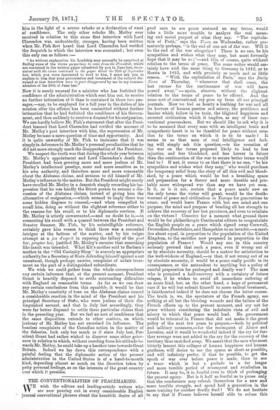MR. FISH AND MR. MOTLEY.
NIR..MOTLEY'S correspondence with Mr. Fish on the sub- 1 ject of the former's recall by President Grant and its causes, is quite a curiosity in the history of diplomacy, and ends very appropriately in a quotation made by Mr. Fish from Dickens's "Old Curiosity Shop," wherein some gossip between Kit's mother and Barbara's mother as to presumed coincidences in those ladies' careers is retailed. After carefully perusing it,— a process from which we have, on the whole, derived more enter- tainment than instruction,—we should say that Mr. Motley made one or two serious mistakes at the very commencement of his ministry, and was not very frankly treated by the President on occasion of those mistakes ; that the mode of his recall was cer- tainly peremptory and unusual ; and that the reply by Mr. Fish to Mr. Motley's statement of personal grievances is somewhat vulgar, or, at all events, in exceedingly bad taste. On the other hand, it is quite clear that Mr. Motley had, quite un- consciously, unfitted himself for the conduct of the Alabama negotiations in the sense desired by the President, by making a personal study of the controversy, and imbuing his mind too completely with his own view of it ; and that he has been credulous and mistaken in assigning to personal animosity against Mr. Sumner the President's dis- trust of himself. The truth is, Mr. Motley did a most foolish thing on the first news of his appointment as British Minister. While waiting at Washington for his instructions, he got up the subject of the Alabama claims, and the precedents bearing upon them, and wrote a memoir thereon. This was certain to excite President Grant's jealousy, especially as the memoir was couched somewhat in the tone of Mr. Sumner's speech on moving the rejection of the treaty negotiated by Mr. Reverdy Johnson with the Government of President Grant's predecessor. Possessed with the notion that Mr. Reverdy Johnson had failed through excessive complaisance towards Great Britain, Mr. Motley determined not to err from the same cause, and his "Memoir" was evidently well calcu- lated to excite the fear of the President that he knew too much about the subject, and had taken up too decided a posi- tion upon it to be a pliant instrument in the President's hands. We are disposed, after comparing Mr. Fish's statements with Mr. Motley's, to attribute in no small degree to this jealousy of the President's, the reasonable and pacific line he has since marked out for himself on the subject of the Alabama claims. It is pretty clear that the greater the displeasure the President has felt at Mr. Motley's disposition to give a tinge of his own to the Alabama negotiation, the more reasonable has been his own view of the British position in the matter, and the more moderate he has become. Perhaps we have to thank Mr. Motley for rendering the President well disposed to meet us on the Alabama claims, just as we had to thank Mr. Reverdy John- son for rendering the Senate ill disposed to meet us on those claims. The American diplomatist appears to have a good • &al more influence in exciting prepossessions at home against what he does or attempts to do, than the English diplomatist. His superiors and the public are both, in different directions, a little jealous of him. If he takes the popular line, makes speeches, and professes to express the feeling of his country, Congress and the Press are at once eager to disavow and suspect him. If he takes the student's line, keeps his own counsel, gets up his subject, and writes memoirs upon it, his master distrusts him, and suspects him of a wish to get the bit between his teeth. Mr. Reverdy Johnson fell into the first mistake. Mr. Motley has fallen into the last.
It was a mistake for the new Minister even to have a strong view of his own at all on any diplomatic question of great impor- tance, if he could help it,—for such a view does colour the most impartial man's report of his master's view,—and it was a still greater mistake to express it, and greatest of all to commit it to writing in an elaborate form, and allow his superior to see what he would have said if he had been been master instead of minis- ter. Of course the President did not adopt it ; of course he went rather more anxiously counter to it than he would have done if he had not suspected his subordinate of a secret bias ; and of course he was prepared to find him preferring his own view to that of the Government. This was Mr. Motley's first mistake. The second seems to be that in his first official interview with Lord Clarendon, on the 10th June, 1869, he certainly did give some tinge of his own Sum- nerite views to his official description of the position of President Grant's Government in relation to the Alabama claims. He not only referred to the question of the recogni- tion of the belligerent rights of the South in a somewhat less moderate tone, or with something less of the spirit of modera- tion,—for it is very difficult to discover any real divergence of meaning,—but he seems to have explained somewhat freely what he was not authorized to explain, why Mr. Reverdy Johnson had been rejected by the Senate, and to have referred to the possibility of war in a tone supposed by the President to be threatening, instead of speaking of the future in the hopeful spirit which his instructions had apparently contemplated. In a word, it does not seem questionable but that Mr. Motley, in his first official interview with Lord Clarendon, on the 10th Jane, 1869, unintentionally gave a different and somewhat darker colour to the President's views than his instructions warranted. Moreover, though he pri- vately submitted his official despatch reporting this interview with Lord Clarendon to the latter for verification, he made no mention in his despatches of having done so till a month later, an omission in itself a fault, and tending to conceal, says Mr. Fish, the importance really attaching to Mr. Motley's apparent misapprehension of his instructions, since it was at first hoped that the false colouring might have been more in his own subsequent account of the interview than in what he actually said at it, a view which could not hold after the despatch narrating it had been verified by Lord Clarendon.
So far it is clear that Mr. Motley, evidently quite uninten- tionally, did really overshoot the spirit of his instructions,— though certainly not, as Mr. Fish maintains, that he acted "in direct opposition to their temper and spirit ;" indeed, if that temper and spirit are to be judged by Mr. Fish's own despatch of the 25th September, 1869, it is not easy to admit that Mr. Motley misrepresented his instructions at all seriously. Nor are we disposed to believe that the very serious displea- sure which Mr. Fish now asserts that the President felt con- cerning this incident, was really felt so long ago as in June or even in October, 1869 ;—we may explain, by the way, that, owing to a temporary absence of Mr. Fish from his duties, it was not till October that he and President Grant learnt that Lord Clarendon had verified the account of Mr. Motley's interview with him on the 10th June, a circumstance which seems to have added a very mysterious element of bitterness to the annoyance of Mr. Motley's superiors. It is certainly remark- able that the whole of Mr. Motley's diplomatic offence,—the whole, that is, of which Mr. Fish even hints any accusation, —was begun and completed in the commissions and omissions of his very first official interview with Lord Clarendon and his despatch recounting it. He said too much and in too hostile a tone on the 10th of June, 1869; he forgot to report on the 12th June, and did not report till a month later, that his despatch recounting the interview had been submitted to Lord Clarendon for verification. But here his offence began and. ended. There is no hint of any subsequent accusation charged against him. When Mr. Motley found that he had not satisfied the President, he hastened to correct himself to Lord Clarendon, and to state that at his previous Interview he had inadequately stated the President's meaning ; he asked for leave to read, and read the very words of Mr. Fish's despatch of the 25th September of the same year in order to avoid misconceptions ; and he continued for a year after his offence had been committed to enjoy apparently the full confidence of his Government in relation to all the matters intrusted to him, and never re- ceived,—so Mr. Motley says, and Mr. Fish evidently confirms him,—the slightest expression of dissatisfaction, except in relation to this one interview. And even in relation to this one interview, what was Mr. Fish's language ? The only rebuke was contained in the following passages :— " Department of State, Washington, 29th June, 1869.
" have to acknowledge the receipt of your despatch 'No. 8,' dated June 12, and have read with much interest its narrative of your very important interview with Lord Clarendon. Your general presenta- tion and treatment of the several subjects discussed in that interview meet the approval of this Department. In the course of the conversa- tion, however, it seems that the President's view of the right of every Power, when a civil conffiot has arisen within another State, to define its own relations and those of its citizens, was not conveyed in precise conformity to that view, as I desired to present it to you, and as it would doubtless have been conveyed by you had your communication been made in writing In the mean time, you may be well content to rest the question on the very forcible presentation you have made of the American side of the question. It was strongly done, and if there were expressions used stronger than were required by your instructions, the excess was in the right direction; and, stopping where they do, and uttered as they were, it may well be hoped that they may tend to impress the Minister with the seriousness of an appreciation of the grievances we have sustained.—I am, Sir, your obedient servant,
"John Lothrop Motley, Esq." "HAMILTON FISH."
The most that this rebuke comes to is that Mr. Motley had put matters a shade too strongly, but had been, nevertheless, approved, though advised to be milder in future. But Mr. Fish says that the intimation contained in the same despatch that the President wished to have the Alabama negotiations, when entered upon, conducted in America, and not by Mr. Motley in England, was tantamount to a very "severe rebuke," and equivalent to a declaration of "want of confidence." Mr. Motley, however, asserts that before his mission commenced, and while still at Washington, he clearly understood that the negotiations, if resumed, and if the British Government should give its consent, were to take place on the American side of the water, so that this intimation by no means appeared to him in the light of a severe rebuke or a declaration of want of confidence. The only other rebuke Mr. Motley ever received in relation to this same first interview with Lord Clarendon was, undoubtedly, stronger, having been written when Mr. Fish first heard that Lord Clarendon had verified the despatch in which the interview was recounted ; but even this only ran as follows :— "As without explanation his Lordship may naturally be surprised at finding some of the views pwporting to come from the President, which are contained in the written paper submitted by you in June last, incon- sistent with the views contained in the paper dated the 25th of September last, which you were instructed to read to him, I must ask you to explain to him that your presentation and treatment of the subject dis- cussed at that interview were in part disapproved by me in my comma- nieation of the 28th of June last."
Now it is surely unusual for a minister who has forfeited the confidence of the administration which sent him out, to receive no further intimation of it than is contained in these two pas- sages,—nay, to be employed for a full year in the duties of his mission after the offence has been committed without further intimation that he had forfeited the confidence of his Govern- ment, and then suddenly to receive a demand for his resignation. We can hardly believe Mr. Fish's statement that after the Presi- dent learned that Lord Clarendon had verified the account of Mr. Motley's past interview with him, the supersession of Mr. Motley became a mere question of time and opportunity. And it is quite unworthy of Mr. Fish to insinuate that it was simply in deference to Mr. Motley's personal peculiarities that he did not more strongly mark the disapprobation of the President.
We suspect the truth was that during the whole year between Mr. Motley's appointment and Lord Clarendon's death the President had been growing more and more jealous of Mr. Motley's intellectual prestige, more and more sensitive as to his own authority, and therefore more and more reasonable about the Alabama claims, and anxious to rid himself of Mr. Motley's influence in the matter. But the President might surely have recalled Mr. Motley in a despatch simply recording his im- pression that he was hardly the fittest person to resume a dis- cussion of the Alabama claims, instead of giving him the alternative of resignation,—which seemed to imply there was some hidden disgrace to conceal,—and when compelled to recall him, doing so without the slightest reference either to the reasons for his recall, or to his diplomatic services. If Mr. Motley is utterly unwarranted,—and no doubt he is,—in connecting his recall with a quarrel between the President and Senator Sumner, Mr. Fish, by his unintelligible reticence, certainly gave him reason to think there was a concealed intrigue at the bottom of the matter, and by his vulgar attempt at a jeu cr esprit in exposing the fallacy of the post hoc, propter hoc, justified Mr. Motley's surmise that something like insult was intended. What Kit's mother said to Barbara's mother in the "Old Curiosity Shop" is scarcely an appropriate authority for a Secretary of State defending himself against a not unnatural, though perhaps unwise, complaint of unfair treat- ment on the part of a distinguished subordinate.
We wish we could gather from the whole correspondence any certain inference that, at the present moment, President Grant is heartily disposed to settle outstanding difficulties with England on reasonable terms. As far as we can draw any certain conclusions from this squabble, it would be that Mr. Motley's causticity of tone on the Alabama claims caused a considerable reaction in the mind of the President and his principal Secretary of Stale, who were jealous of their dis- tinguished servant, and that in July last accordingly, they were far better disposed to settle these particular claims than in the preceding year. But we feel no sort of confidence that the same disposition extends to other matters, on which jealousy of Mr. Motley has not exercised its influence. The baseless complaints of the Canadian action in the matter of the fisheries, look only too much as if since July last, Pre- sident Grant had rather wished to discover some other griev- ance in relation to which, without receding from his attitude to- wards Mr. Motley, he could take up a harsher tone towards Great Britain. Indeed we lay down this correspondence with a painful feeling that the diplomatic action of the present administration in the United States is of a hand-to-mouth kind, depending almost as much on the direction taken by petty personal feelings, as on the interests of the great country over which it presides.




































 Previous page
Previous page